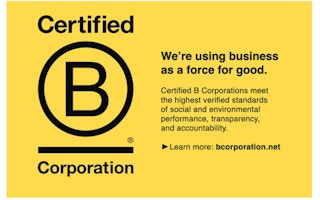B Lab, a United States-headquartered certification non-profit, is setting up shop in Southeast Asia with a mission to grow a community of B Corporations, or B Corps, and advance stakeholder capitalism in the region.
Since B Lab certified its first batch of businesses in 2007, there are now 3,944 certified B Corps across 150 industries in 74 countries, but still only 13 in Singapore, two in Indonesia, and one in Malaysia.
After establishing a Southeast Asia hub in Singapore, B Lab is aiming to certify 100 businesses across the region by 2025, B Lab’s Southeast Asia community builder Caroline Seow told Eco-Business.
“We provide a framework for companies to measure, manage and advance stakeholder impact. Without measuring performance and setting goals to improve, it [sustainability] is just all talk,” said Seow, who is currently fundraising to staff the operation.
To become a B Corp involves meeting some of the highest social and environmental standards in sustainable business certification. Only a third of companies that submit for certification are certified.
Companies use an online tool to assess the sustainability of their entire business, including governance, community and environmental impact, and the treatment of workers and customers. Firms that earn a minimum score of 80 out of 200 points are then verified and reviewed by B Lab.
“
When we transitioned into a renewable business our scores got progressively better.”
Robin Pho, CEO, Right People Renewable Energy
To stay certified, B Corps must get reassessed every three years, and must continually improve their social and environmental credentials.
The assessment tool is free, but companies pay an annual fee for certification, which ranges from US$1,000 for a firm with sales of US$150,000 to US$50,000 for a billion-dollar firm.
The review process currently takes between six and 10 months to complete, due to “overwhelming interest”, B Lab states on its website.
What is a B Corp?
Founded in 2006 in Berwyn, Pennsylvania.
The ‘B’ stands for beneficial.
The aim is for certified organisations to meet certain standards of transparency, accountability, sustainability, and performance, to create value for society — not just for traditional stakeholders such as the shareholders.
Some sample questions companies need to answer on the way to becoming a B Corp:
How many of your company managers identify as women?
What attributes of a diverse workforce does your company track?
What is the company’s lowest wage?
How does your company integrate social and environmental performance into decision-making?
How does your company monitor and manage waste production?
Do any of your company’s products or services address a social or economic problem for your customers?
What practices does your company have in place to promote ethical decision-making and prevent corruption?
B Corps include The Guardian newspaper, ice cream brand Ben & Jerry’s, clothing firm Patagonia, and file sharing service WeTransfer. The first B Corp in Singapore was Bettr Group, a coffee company and education centre founded in 2011. Communications company VS Story, computing firm Palo IT, social food brand Boxgreen, fund managers Panarchy Partners, cleaning business Spic & Span, and Right People Renewable Energy are among other local B Corp certified firms in Singapore.
The idea to establish B Lab in Southeast Asia came while Seow was looking for a sustainability framework that would enable family businesses to benchmark and improve their stakeholder impact. Seow is strategic advisor, sustainability and impact for Family Business Network International, a non-profit that supports family firms.
“Family businesses think in generations not quarters. They’re not just here to make a quick profit. They want a forward-thinking, sustainable business that can be handed down to the next generation, and B Corps tend to be resilient and future-focused,” said Seow, adding that attaining B Corp certification is generally easier for smaller businesses.
There are numerous advantages to B Corp certification, Seow said. Though not broadly recognised in Southeast Asia, B Corp certification holds weight among those in the know, and helps attract and retain talent. DBS Bank is more likely to award a loan to a B Corp than a regular firm, she noted.
It took Robin Pho, founder and chief executive of Right People Renewable Energy, four years to get his family business B Corp certified. The process was complicated by Pho’s company pivoting from being a supplier of manpower to the oil and gas industry to a renewables firm during that time.
“Sometimes we didn’t have time to complete the assessment, and it gets harder over time,” Pho told Eco-Business. “In the first few years, our score was 50-60, and for a moment, I gave up [companies must reach a score of at least 80]. But when we transitioned into a renewable business our scores got progressively better.”
Robin Pho has been selected as an ambassador for B Corp in Southeast Asia, along with Jacqui Hocking, chief executive of VS Story.

















